News
Awarding of the Erika Weinzierl Prize 2025 for outstanding thesis work within the framework of the Social Pedagogy Working Group
This year’s Erika Weinzierl Prize 2025 was awarded to Anna-Maria Penetsdorfer for her outstanding master’s thesis. Anna-Maria Penetsdorfer’s master’s thesis analyzes the sex education text “Geschlechtsgeheimnis und Erziehung […]” (1958/1964) by the Salzburg (religious) educator Leopold Prohaska (1905-1980) and was awarded for its high scientific quality and its social and disciplinary relevance to academic pedagogy in Salzburg.
In a jury member’s review of this work, we read: “To date, there has been no empirical-theoretical research on the chosen topic for Austria and Salzburg; this master’s thesis represents the first examination of academic pedagogy in the period under investigation with regard to its gender-constituting knowledge production. The work, which can be located at the intersection of gender studies, social pedagogy, and religion/catholicism, sharpens the eye for the continuities of androcentric interpretive structures.”
An article on this work was published this year in the Austrian Yearbook for Social Work (ÖJS).
The Erika Weinzierl Prize honours academic work that makes a significant contribution to the analysis of social power relations, issues of gender equality and the expansion of feminist and gender studies perspectives. On Monday evening (24 November 2025), these outstanding achievements in gender studies at PLUS were honoured in a festive ceremony. This is yet another occasion on which outstanding research work in the field of social pedagogy has been honoured: in 2023, the Erika Weinzierl Scholarship was awarded to Fatemeh Rezaee for her dissertation project.
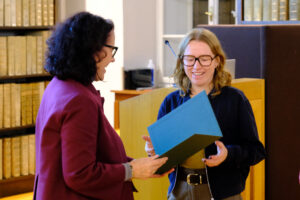
The Social Pedagogy Working Group is delighted about this award and recognition of the work and congratulates Anna-Maria Penetsdorfer on this success!
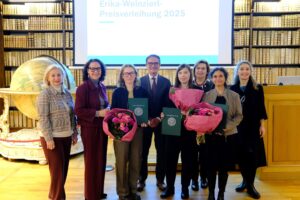
Invitation to Social Pedagogical Perspectives
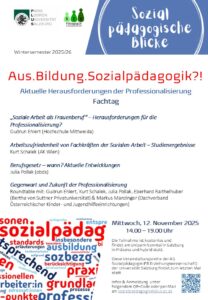
The lecture series “Social Pedagogical Perspectives” will take place this fall/winter semester 2025/26 as a symposium on November 12, 2025, from 2 to 7 p.m. Under the title “Education.Social Pedagogy?!”, we would like to focus on current developments in the context of professionalization. To this end, we have invited representatives from academia, practice, and professional associations to contribute to the symposium. Gudrun Ehlert (Mittweida University of Applied Sciences) will address gender aspects of professionalization, Kurt Schalek (AK Vienna) will present current study results on the working situation of skilled workers, and Julia Pollak (obds) will report on current developments regarding a professional law. Finally, we would like to discuss current challenges and possible future prospects in a roundtable discussion with Eberhard Raithelhuber (Bertha von Suttner Private University) and Markus Manzinger (Dachverband der Österreichischen Kinder- und Jugendhilfeeinrichtungen).
The event is planned as an in-person event, but hybrid participation is possible. As always, participation is free of charge, but registration is requested.
Further information can be found here.
Finally, we would like to point out that this symposium marks the end of the “Social Pedagogical Perspectives” series. We would like to take this opportunity to thank you for your long-standing and keen interest and the always stimulating exchange of ideas, and we look forward to seeing many of you at this final event.
Statement by the Working Group on the incidents at SOS Kinderdorf
In light of media reports (Falter article “Schläge, Erniedrigungen, Missbrauch: SOS aus dem Kinderdorf,” September 16, 2025) on the incidents at an SOS Kinderdorf facility, we at the Working Group on Social Pedagogy would like to publish our statement on the matter.
We are available to answer any questions you may have, preferably via email ().
Qualification framework for social work in Austria
With the publication of the Qualifications Framework for Social Work in June 2025, the professional community created a central document on the content of training programs for social workers and social educators in higher education in Austria. This establishes a common basis for all tertiary education institutions that offer training programs for social workers and social educators.
Participatory creation by the professional community
The qualification framework is the result of several years of intensive professional exchange within the professional community. Representatives from universities, professional associations, and scientific networks participated in the process, providing ongoing information about drafts and development steps in their committees. The document was created by the Social Pedagogy Working Group at Paris Lodron University of Salzburg, the Departmental Conference on Social Work Programs at Universities of Applied Sciences (FBKSSO), the Austrian Social Pedagogy Network, the Austrian Professional Association for Social Work (obds), the Austrian Society for Social Work (ogsa), the Austrian Professional Association for Academic Social Pedagogy (ÖFAS), and the Social Pedagogy Section of the Austrian Society for Research and Development in Education (ÖFEB) in June 2025.
Download available: Qualifikationsrahmen
ÖFEB Section Conference on Social Pedagogy
We are delighted to invite you to this year’s ÖFEB Section Conference on Social Pedagogy 2025 at the University of Salzburg on September 25 and 26.
The conference on the topic of “Boundaries and Boundary Removal – Discourses, Practices, and Challenges in Social Work” offers the opportunity to gain insights into current research projects and discourses. From the numerous submissions, we have been able to put together an interesting program with more than 50 contributions. In addition to the panels, we would like to draw particular attention to the following keynotes and lectures during the conference:
- Birgit Bütow (University of Salzburg): Boundaries and “boundary work” in social work: between inspiration and conceptual model.
- Clarissa Schär (University of Applied Sciences Northwestern Switzerland): Hearing children and young people in child protection: A boundary-analytical examination of the implementation of participation rights.
- Karin Bock, Rita Braches-Chyrek, and Martin Grosse (Dresden University of Technology and University of Bamberg): Boundaries and delimitations through processuality in social pedagogical research contexts?
- Paul Mecheril, Laura Meyer-Stolte, and Antonia Dahlmeier (University of Bielefeld): Conditions for successful practice: Scientific evaluation of inpatient services provided by Backhaus Kinder- und Jugendhilfe.
Further information about the conference and the detailed conference program can be found on the conference website.
Invitation Social Pedagogical Views
Socio-educational perspectives
The lecture series “Sozialpädagogische Blicke” will be held for the tenth time this coming fall/winter semester. As part of this anniversary, we are not only inviting colleagues from academia and practice to contribute their perspectives. We also want to provide insights into completed research projects of our working group.
On three evenings, we would like to discuss institutionalized childhood and youth as well as the associated possibilities and limitations. We will begin on 20.11.2024 with the question of what it means when pupils withdraw from the education system. On the second evening (11.12.2024), we will take a look at the situation of young people in residential child and youth care. Finally, on 15.01.2025, we will look at how children grow up and everyday practice in elementary educational institutions (this date has been postponed from September to January).
The entire lecture series is designed as an interweaving of contributions from science and practice. It is offered on Wednesdays from 5-7pm at the University of Salzburg in a hybrid format.
More information can be found here.
Call for Papers – ÖFEB Section Conference 2025
We encounter boundaries in the field of social work and social pedagogy in many different ways. They are evident in the concrete fields of action – for example in the sense of spatial, temporal or social dimensions – and also in the scientific treatment of ‘the subject matter’, for example with regard to the reflexive treatment of boundaries. At the same time, they themselves are not fixed, but are to be seen as having ‘become’ in the context of the negotiation and tension of boundary and delimitation.
The heading of boundaries and dissolution of boundaries in social work suggests a social diagnosis that has already been tried and tested in a number of publications. However, the planned conference attempts not only to frame the diverse conditions and current processes of change in social work, but also to explore the potential of the metaphors of ‘boundaries’ and ‘boundary management’ on the basis of a wide range of contributions.
Over the last 20 years, the concepts and metaphors of ‘border(s)’ and ‘border management’ have become important methodological approaches in the analysis and critique of social pedagogical thought and action – including social conditions and socio-political framings. Boundaries and boundary management refer to certain spatial, temporal and social orders in which social work operates, and in doing so must constantly re-articulate and reflect on responsibilities and possibilities. This can be seen not least in historical and current reconstructions, for example in the areas of tension between child and youth welfare and other professions or institutions – or in debates about inclusion, to name just two striking examples.
The Call for Papers in English is available here.
Mission statement for the working group “Qualifications framework/further development of the core curriculum for social work”
First draft based on the round table on 09.07.2024 in Salzburg
The aim of the working group “Qualifications Framework for Social Work/Further Development of the Core Curriculum for Social Work” is to create a document that …
… describes a framework with core elements for vocational and academic training in social work, in which both social pedagogy and social work with their overlapping areas and respective specifics are reflected.
… describes minimum content for vocational and academic training in social work in the form of tasks and skills to be acquired that are required from a professional point of view in order to be able to use one or more of the protected professional titles under the SozBezG (social worker, social pedagogue).
… contributes to quality assurance in the training of professionals in the field of social work.
… promotes further development in practice-related and academic disciplines as coherently as possible.
… proposes a common framework for all training institutions that offer vocational and academic social work training (universities of applied sciences, universities), within which location-specific priorities can be set.
… takes into account the preliminary work from the “Core Curriculum for BA Programs in Social Work at Universities of Applied Sciences” and, as far as possible, does not contain any contradictions, but at most indicates a need for further clarification.
… takes into account both the obds identification framework for social pedagogy and social work and the explanatory notes on the SozBezG.
… forms the basis for coordination in the social work professional community (professionals, professional organizations) in order to supplement the obds identification framework for social pedagogy and social work with a “social work qualification framework”.
… can serve as a basis for decision-making bodies in the context of recognition and nostrification procedures, thus contributing to the clarification of the basic features of social work and also providing more certainty for professionals and interest groups.
Dr. Melanie Holztrattner’s dissertation receives two awards
Lex-Nalis Prize Holztrattner 2023
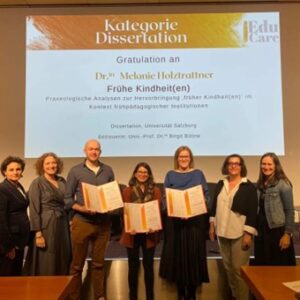
Photo: Heide Lex-Nalis Prize | © EduCare
Dr. Melanie Holztrattner from the Department of Educational Science, WG Social Pedagogy at Paris Lodron University Salzburg (PLUS) receives the Heide Lex-Nalis Prize 2023 and the AK Salzburg Science Prize
Research workshop ‘WERKSTATT. FORSCHUNG. rekonstruktiv
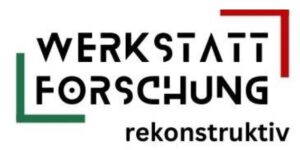
Reconstructive research needs time and space where exchange is possible – especially for a joint discussion of empirical material and methodological-methodological questions. This possibility is to be offered within the framework of the ‘WERKSTATT. FORSCHUNG. rekonstruktiv’, which is organised in cooperation with the Salzburg University of Education.
Further information on the research workshop can be found here.
Research projects
An overview of all topics currently being researched by the WG Social Pedagogy and more detailed information can be found here.
The completed research projects of the AG Sozialpädagogik are presented here.
Journal ‘Austrian Yearbook for Social Work ’OEJS Volume 5
The Austrian Yearbook for Social Work – ÖJS – has been published since 2019. The journal sees itself as a publication venue for professional and disciplinary discussions. It presents research findings and topics from Austria and picks up on international discourse. The aim of the journal is to reflect developments in social work at a high scientific level and to further develop specialist discussions.
Authors and interested parties can find information about the journal ÖJS here.
(Event) archive
An insight into the topics dealt with by the AG Sozialpädagogik in the context of events is offered here.





